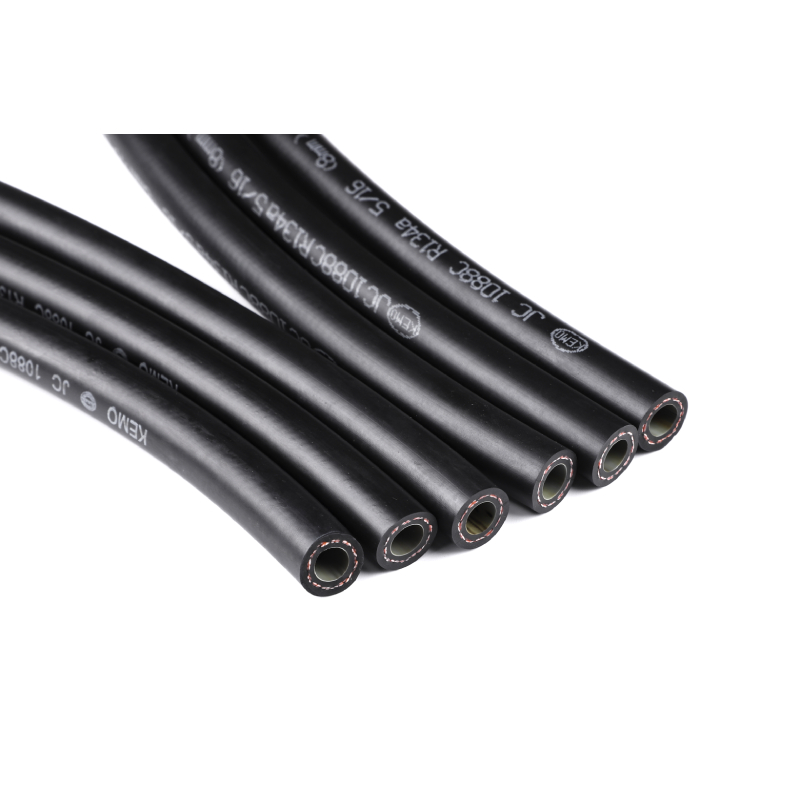Flexible Fuel Return Hose for Efficient Fuel System Performance
დეკ . 29, 2024 19:38 Back to list
Flexible Fuel Return Hose for Efficient Fuel System Performance
Understanding Fuel Return Hoses Importance, Functionality, and Maintenance
In modern automotive engineering, the efficient management of fuel systems is crucial for performance, safety, and environmental compliance. Among the various components that contribute to this intricate system, the fuel return hose plays a pivotal role. This article explores the importance, functionality, and maintenance of fuel return hoses, shedding light on their essential contributions to vehicle operation.
What is a Fuel Return Hose?
A fuel return hose is a critical component in a vehicle's fuel system, designed to transport excess fuel from the engine back to the fuel tank. This process becomes particularly relevant in fuel-injected engines, where the fuel pressure must be precisely regulated. Instead of simply returning unused fuel directly to the tank, the fuel return hose ensures that the fuel system maintains optimal pressure, enhancing engine efficiency and performance.
Functionality of the Fuel Return Hose
The operation of a fuel return hose is relatively straightforward yet vital. When the engine is running, the fuel pump draws gasoline from the fuel tank, sending it to the fuel injectors. These injectors spray a pre-determined amount of fuel into the engine cylinders for combustion. However, not all the fuel that reaches the injectors is used immediately. Therefore, the surplus fuel needs to be redirected back to the tank through the fuel return hose.
This recycling mechanism helps in regulating the fuel pressure in the system. If the return hose were absent, excess fuel would lead to elevated pressure levels, potentially causing injectors to malfunction or even damaging the fuel system. Therefore, the fuel return hose contributes to maintaining steady pressure levels, ensuring that the engine receives the necessary fuel efficiently and effectively.
Materials and Construction
Fuel return hoses are typically made from high-quality, fuel-resistant materials designed to withstand varying temperatures and pressures inherent in the fuel system. Common materials include reinforced rubber, thermoplastic elastomers, and synthetic compounds engineered to resist degradation over time. The choice of material is not merely for durability; it also ensures that the hose does not leach harmful substances into the fuel, which could affect engine performance and emissions.
Signs of Wear and Tear
Like any automotive component, fuel return hoses are subject to wear and tear over time. Regular inspection is crucial for vehicle safety and performance. Common signs of deterioration include
fuel return hose

1. Cracks or Fraying Visible damage on the surface of the hose may indicate a need for replacement.
2. Leaking Fuel Any sign of fuel leakage around the hose connections is alarming and could result in serious safety hazards, including fire risks.
3. Loss of Engine Performance If the engine struggles, stalls, or exhibits irregular idle behavior, it could be a sign that the fuel return system is compromised.
Maintenance Tips
To prolong the life of your fuel return hose and ensure the overall health of your fuel system, consider the following maintenance tips
- Regular Inspections Check for signs of wear on the hose regularly, especially when performing routine maintenance or inspections.
- Replace When Necessary If any signs of damage are detected, replace the hose promptly to avoid more serious fuel system issues.
- Avoid Contaminants Ensure that the fuel being used is of good quality and free from contaminants that could impair the fuel system's functionality.
- Professional Inspections Consider having a professional mechanic inspect your fuel system during routine service intervals to catch any potential issues early.
Conclusion
Fuel return hoses, though often overlooked, are essential to the effective operation of a vehicle's fuel system. Understanding their importance, functionality, and maintenance can lead to better vehicle performance, improved safety, and enhanced longevity of automotive components. By taking care of this critical element, drivers can ensure their vehicles run efficiently while minimizing the risk of costly repairs down the line. Regular checks, timely replacements, and pro-active maintenance can make a significant difference in the health of your fuel system.
Latest news
-
Durable Automotive Fuel Line: Car, Diesel & E85 Hoses
NewsAug.27,2025
-
Automotive Fuel Line & Hose Solutions | E85 & Diesel Ready
NewsAug.26,2025
-
Reliable Automotive Fuel Line | E85 & Diesel Compatible
NewsAug.25,2025
-
Durable Car Heater Hose | Quality Automotive Preheater Pipes
NewsAug.24,2025
-
Durable Air Brake Hose & Air Lines for Trucks | Safety Ensured
NewsAug.23,2025
-
Air Conditioning Charging Hose: Durable AC Recharge Kits
NewsAug.22,2025
